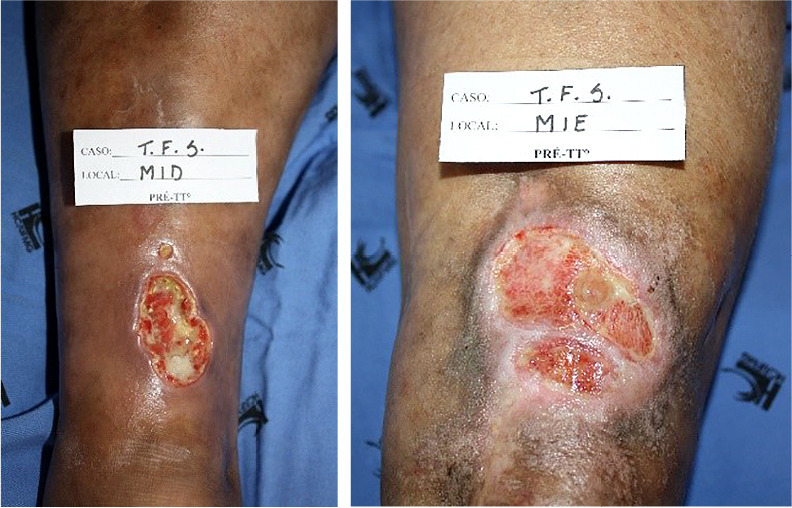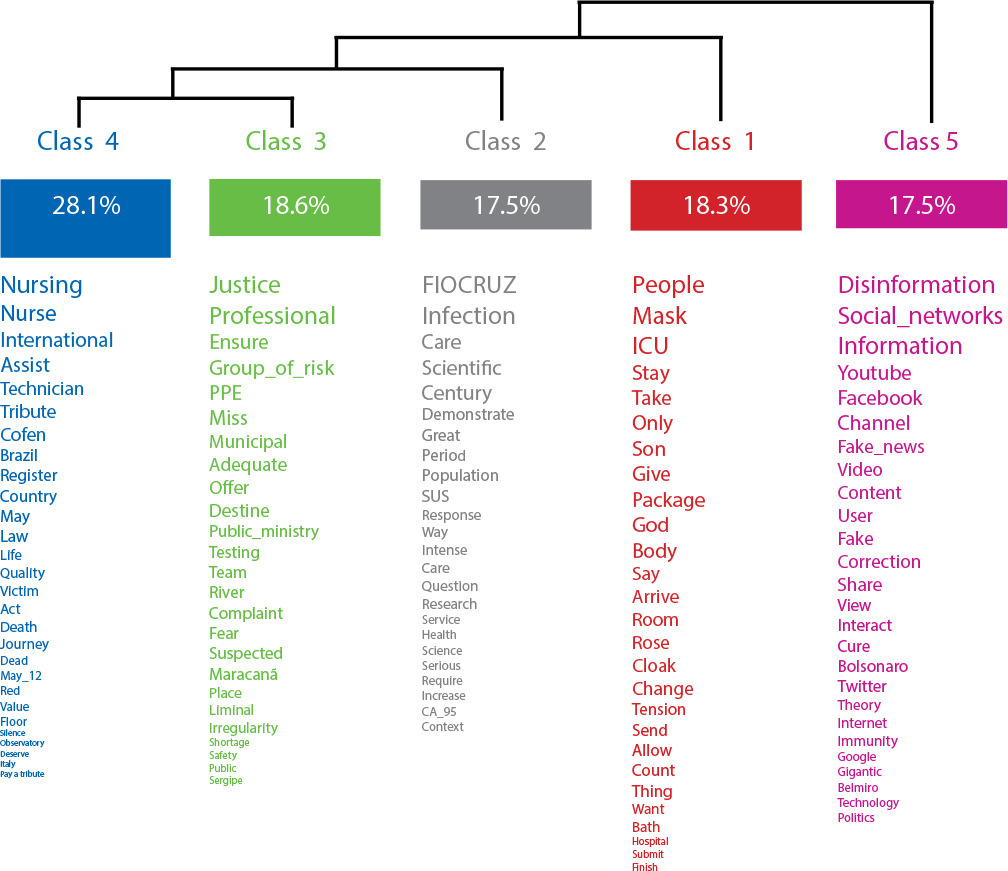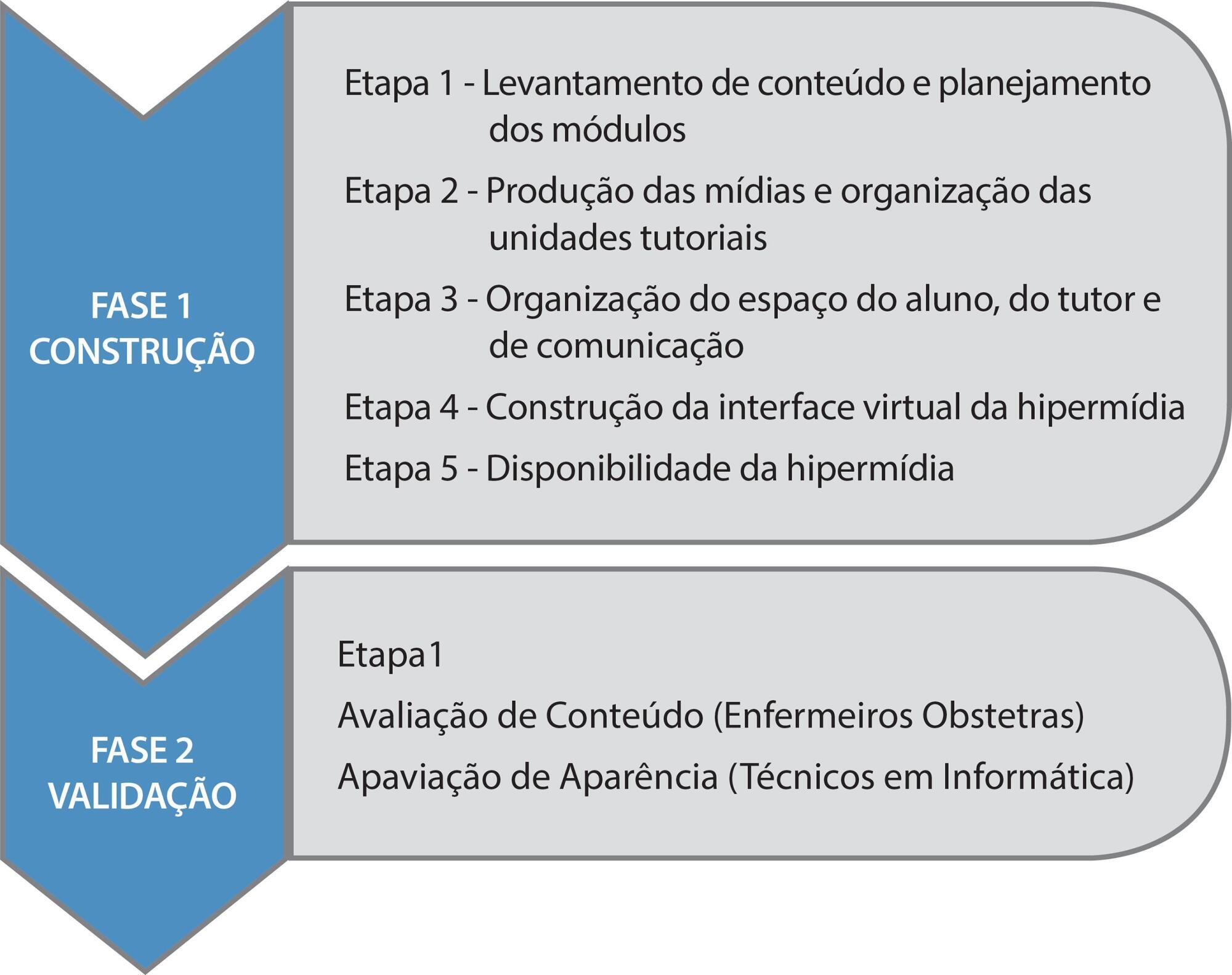-
EXPERIENCE REPORT10-25-2022
Patients who experience systemic lupus erythematosus and leg ulcer: phenomenological approach
Revista Brasileira de Enfermagem. 2022;75(2):e20200081
Abstract
EXPERIENCE REPORTPatients who experience systemic lupus erythematosus and leg ulcer: phenomenological approach
Revista Brasileira de Enfermagem. 2022;75(2):e20200081
DOI 10.1590/0034-7167-2020-0081
Views0See moreABSTRACT
Objective:
To understand the experience of a woman with systemic lupus erythematosus and leg ulcers with cutaneous calcinosis.
Methods:
An experience report based on the social phenomenology of Alfred Schutz, conducted with a young woman undergoing treatment in an outpatient service.
Results:
The disease manifested itself in adolescence and brought emotional instability associated with body image concern and social isolation. The discontinuation of the studies triggered financial limitations with implications for treatment. The presence of ulcers aggravated by skin calcification makes the process of getting sick tiring and painful. Interpersonal relationships are resources for coping with situations experienced.
Final considerations:
Patients with lupus may have social, affective, and family life, even in the face of the limitations imposed by the disease. However, the emergence of leg ulcer with calcinosis changes this situation.

-
ORIGINAL ARTICLE10-25-2022
COVID-19 pandemic and nursing week: analysis from software Iramuteq
Revista Brasileira de Enfermagem. 2022;75:e20200690
Abstract
ORIGINAL ARTICLECOVID-19 pandemic and nursing week: analysis from software Iramuteq
Revista Brasileira de Enfermagem. 2022;75:e20200690
DOI 10.1590/0034-7167-2020-0690
Views0See moreABSTRACT
Objective:
to analyze the themes of publications on the Federal Council of Nursing (Cofen) website during Nursing Week 2020.
Method:
documentary, qualitative research, whose data sources were publications on the Cofen website from May 12 to 20, 2020. Data were processed by software IRAMUTEQ®, through the Descending Hierarchical Classification and analyzed under the historical materialism framework.
Results:
thirty publications were analyzed, giving rise to five classes.
Final considerations:
the themes published in the period investigated pointed to the grief experienced by the category, due to the death of its members, and the fight for better working conditions. Overcoming the pandemic involves recognizing science and the Unified Health System, protecting nursing workers’ health and fighting misinformation and fake news.

-
ORIGINAL ARTICLE10-25-2022
Online mental health care during the COVID-19 pandemic
Revista Brasileira de Enfermagem. 2022;75:e20210554
Abstract
ORIGINAL ARTICLEOnline mental health care during the COVID-19 pandemic
Revista Brasileira de Enfermagem. 2022;75:e20210554
DOI 10.1590/0034-7167-2021-0554
Views0See moreABSTRACT
Objective:
Identify users, services, and reasons for seeking online mental health care during the COVID-19 pandemic.
Methods:
A descriptive, retrospective study, with documentary analysis of medical records of users served between April and July 2020.
Results:
Of the 258 accesses, 159 were complete, and 99 were offline messages. Although there were 61 (38.36%) consultations in May, in April, there were 49 (30.82%) in 18 days of reception. More than 89% of accesses were women between 40 and 59 years. Among the motivations in the search for care, anxiety, fear, depression, sadness, crying, stress, and suicidal ideation stand out.
Final considerations:
Chat is a quick, early and short-wait intervention opportunity for people in need of mental health care. Therefore, the study emphasizes the importance of investing in the training of nursing professionals to act in mental health.

-
ORIGINAL ARTICLE10-25-2022
Planned home birth assistance: challenges during the COVID-19 pandemic
Revista Brasileira de Enfermagem. 2022;75:e20210083
Abstract
ORIGINAL ARTICLEPlanned home birth assistance: challenges during the COVID-19 pandemic
Revista Brasileira de Enfermagem. 2022;75:e20210083
DOI 10.1590/0034-7167-2021-0083
Views0See moreABSTRACT
Objective:
To understand the challenges faced by urban midwives in assisting planned home births during the COVID-19 pandemic.
Methods:
Qualitative study, based on the Collective Subject Discourse methodological framework, carried out with eight professionals, members of a birth care collective from the northeast region of Brazil. Data was collected between September and October of 2020 using the focus group technique.
Results:
The collective discourses revealed five central ideas: Changing assistance strategy; Dealing with frustration; Facing the fear of contamination; Avoiding exposure to the virus; and Keeping distance during the care process.
Final considerations:
The challenging condition the pandemic brings to the care of planned home births is made evident, being marked by the need for collective protection and the pressure of following health recommendations. The study also points out the need for official protocols and good quality information based on scientific evidence and humanizing principles to guide health care.
-
ORIGINAL ARTICLE10-25-2022
Brazilian nursing in pandemic times and the bicentennial of Florence Nightingale
Revista Brasileira de Enfermagem. 2022;75:e20210081
Abstract
ORIGINAL ARTICLEBrazilian nursing in pandemic times and the bicentennial of Florence Nightingale
Revista Brasileira de Enfermagem. 2022;75:e20210081
DOI 10.1590/0034-7167-2021-0081
Views0See moreABSTRACT
Objective:
To reflect on the role of Brazilian nursing during the COVID-19 pandemic, considering as a historical landmark the bicentenary of the birth of Florence Nightingale, a precursor of modern nursing, celebrated in 2020.
Method:
Theoretical-reflective study, based on Florence Nightingale’s environmental theory through a literature review, carried out in international and national virtual news from different sources and added to the authors’ experiences related to the pandemic.
Results:
It was possible to identify the weaknesses experienced by nurse practitioners as to contagion by COVID-19, the routine of exposure to risks, the lack of adequate protection in many scenarios, the high rates of illness, and also deaths that occurred in this profession.
Final considerations:
Florence Nightingale’s Environmental Theory describes the importance of the adequacy of the work environment. It also emphasizes the value of this professional for contemporary nursing and the redefinition of this professional category during the COVID-19 pandemic.
-
ORIGINAL ARTICLE10-24-2022
Avoidable deaths in the first 24 hours of life: health care reflexes
Revista Brasileira de Enfermagem. 2022;75(1):e20220027
Abstract
ORIGINAL ARTICLEAvoidable deaths in the first 24 hours of life: health care reflexes
Revista Brasileira de Enfermagem. 2022;75(1):e20220027
DOI 10.1590/0034-7167-2022-0027
Views0See moreABSTRACT
Objectives:
to analyze the risks of deaths in the first 24 hours of life and their preventable causes.
Methods:
cross-sectional study carried out in Pernambuco, Northeast of Brazil, between 2000-2019, with mortality and live birth data. The avoidability was analyzed through the Brazilian List of Avoidable Causes of Deaths due to Interventions of the Unified Health System. For the statistical analyses, Pearson’s chi-squared test and relative and attributable risks were used.
Results:
13,601 deaths were registered, of which 10,497 (77.19%) were from preventable causes. Of the total, 5,513 (40.53%) were reducible through adequate care for women during pregnancy. The lower the gestational age, birth weight and education level, the higher the relative and attributable risk of death in the first 24 hours of life.
Conclusions:
most of the deaths were considered avoidable and with high relative and attributable risks. These early deaths suggest care failures and the need to reinforce prevention and treatment measures.
-
ORIGINAL ARTICLE10-24-2022
Factors associated with symptoms of physical and emotional burden in informal caregivers of the elderly
Revista Brasileira de Enfermagem. 2022;75:e20210927
Abstract
ORIGINAL ARTICLEFactors associated with symptoms of physical and emotional burden in informal caregivers of the elderly
Revista Brasileira de Enfermagem. 2022;75:e20210927
DOI 10.1590/0034-7167-2021-0927
Views1See moreABSTRACT
Objectives:
to analyze the personal and work-related burden factors associated with physical and emotional symptoms of informal caregivers of the elderly.
Methods:
cross-sectional study conducted with 121 informal caregivers and 121 seniors who received care, assessed individually for the risk of: physical overload, musculoskeletal symptoms, Self-Reporting Questionnaire, effort perception, and Katz index.
Results:
a greater perception of effort raises up to 3.3 times the chances of presenting symptoms of pain in the spine region (p=0.01), and lower functional capacity of the elderly increases up to 1.3 times the chances of presenting pain symptoms in the spine region (p=0.02). The symptoms of emotional overload were associated with the caregiver’s low income (p=0.02).
Conclusions:
the perception of effort, dependence of the elderly, caregiver’s age, and symptoms of emotional overload are involved with caregivers’ symptoms of physical overload, and low income, with emotional overload.
-
ORIGINAL ARTICLE10-24-2022
Development and testing of the Prev’Quedas game for older adults in the community: a descriptive study
Revista Brasileira de Enfermagem. 2022;75:e20220098
Abstract
ORIGINAL ARTICLEDevelopment and testing of the Prev’Quedas game for older adults in the community: a descriptive study
Revista Brasileira de Enfermagem. 2022;75:e20220098
DOI 10.1590/0034-7167-2022-0098
Views0See moreABSTRACT
Objectives:
to develop and test a board game for fall prevention in older adults in the community.
Methods:
a descriptive study, carried out through the use of game design elements (narrative, mechanics, aesthetics and technology), the Health Promotion Model, assessment by experts and testing with older adults. For assessment, the Concordance Index was used, considering it greater than 80%.
Results:
three prototypes and the final version were developed. The game’s narrative was based on promotion model, comprising individual aspects, benefits and barriers in behavior to prevent falls. The mechanics outlined goals and rules. Aesthetics encompassed layout and illustrations. The technology involved board, cards, pin, roulette and instruction manual. The game was assessed by 36 experts and 31 older women from the community, with a Concordance Index of 93.22% and 99%, respectively.
Conclusions:
the game developed and tested was considered an adequate educational strategy for fall prevention.

-
REFLECTION06-29-2020
Recommendations in covid-19 times: a view for home care
Revista Brasileira de Enfermagem. 2020;73:e20200310
Abstract
REFLECTIONRecommendations in covid-19 times: a view for home care
Revista Brasileira de Enfermagem. 2020;73:e20200310
DOI 10.1590/0034-7167-2020-0310
Views0See moreABSTRACT
Objective:
To suggest recommendations for the practice of Home Nursing in the context of COVID-19.
Method:
Reflective study, originated from readings associated with the theme, available in current guidelines from the Pan American Health Organization, World Health Organization and the Ministry of Health.
Results:
Recommendations were developed from current scientific evidence for prevention of infections, control of epidemics and pandemics in the Brazilian home scenario.
Final considerations:
the reflections achieved contribute to guiding actions for better assistance to the patient, family caregivers and the community in the perspective of safe home care with COVID-19, and it is characterized as an introductory discussion on the theme, encouraging new studies to be carried out from the unfolding of the current scenario.
-
ORIGINAL ARTICLE10-21-2019
Educational hypermedia in nursing assistance at birth: building and validation of content and appearance
Revista Brasileira de Enfermagem. 2019;72(6):1471-1478
Abstract
ORIGINAL ARTICLEEducational hypermedia in nursing assistance at birth: building and validation of content and appearance
Revista Brasileira de Enfermagem. 2019;72(6):1471-1478
DOI 10.1590/0034-7167/2018-0163
Views0See moreABSTRACT
Objective:
to build an educational hypermedia about nursing care at usual risk birth and to perform validation of content and appearance.
Method:
methodological research carried out following the following stages: content and planning of modules; media production and organization of tutorial units; organization of student space, tutor and communication between them; availability of hypermedia; assessment by experts in nursing and informatics; and implementation of proposed suggestions.
Results:
educational hypermedia showed to be a validated material, since it presented an optimum index of global content of 0.97 and statistical significance in the binomial test for the content and appearance.
Conclusion:
it is believed that the use of this material with undergraduate students in nursing will contribute to the quality of obstetric care, considering that it is an illustrated technology capable of favoring teaching-learning about normal humanized childbirth.

-
ORIGINAL ARTICLE09-21-2020
Prevalence of xerostomia in women during breast cancer chemotherapy
Revista Brasileira de Enfermagem. 2020;73:e20190785
Abstract
ORIGINAL ARTICLEPrevalence of xerostomia in women during breast cancer chemotherapy
Revista Brasileira de Enfermagem. 2020;73:e20190785
DOI 10.1590/0034-7167-2019-0785
Views0See moreABSTRACT
Objective:
To identify the prevalence of xerostomia in women undergoing chemotherapy for breast cancer.
Method:
Prospective cohort with 27 women who underwent up to 16 sessions of intravenous chemotherapy. Data collection was performed at the outpatient clinic of a university hospital in the city of São Paulo, where two forms were applied before the start of treatment and the Xerostomia Inventory before and after each chemotherapy session.
Results:
Complaints of dry mouth were present in 48.1% of women before chemotherapy, and they were approximately 28 times more likely to develop dry mouth during treatment. It was observed that the use of antiemetics contributed to the occurrence of xerostomia, and the anti-ulcerous were presented as a protective factor.
Conclusion:
The study identified both a high prevalence of xerostomia regardless of the chemotherapy used and the need to create protocols to improve the quality of life of these patients.
-
04-14-2021
Child behavior during the social distancing in the COVID-19 pandemic
Revista Brasileira de Enfermagem. 2021;74:e20200762
Abstract
Child behavior during the social distancing in the COVID-19 pandemic
Revista Brasileira de Enfermagem. 2021;74:e20200762
DOI 10.1590/0034-7167-2020-0762
Views0See moreABSTRACT
Objective:
To describe the daily activities performed by children from 6 to 12 years of age incomplete and analyze children’s behavior during social distancing in the face of the COVID-19 pandemic.
Methods:
Cross-sectional study with children in a learning stage living in Brazil. The data were collected via online form. Fisher’s exact test was applied to analyze the association of categorical variables with child behavior; when significant, it was used the odds ratio. It was considered results considered statistically significant those presenting values of p < 0.05.
Results:
Data from 530 children were analyzed: 50.3% female, 71.3% from the Southeast Region, 73% in fulltime social distancing, 52% presented anxiety, which was significantly associated with changes in sleep and appetite.
Conclusion:
The results indicate the need for parents/caretakers to stimulate moments for the child to express themselves, not minimizing their feelings and providing emotional support to mitigate the negative impact of these feelings on the child’s mental and physical health.
-
07-12-2021
Coping strategies, concerns, and habits of Brazilian men in the COVID-19 context
Revista Brasileira de Enfermagem. 2021;74:e20210040
Abstract
Coping strategies, concerns, and habits of Brazilian men in the COVID-19 context
Revista Brasileira de Enfermagem. 2021;74:e20210040
DOI 10.1590/0034-7167-2021-0040
Views0See moreABSTRACT
Objective:
To describe coping strategies, concerns and habits of Brazilian men during the COVID-19 pandemic.
Method:
Cross-sectional, descriptive and nationwide study, carried out in 2020 with a total of 1015 men living in Brazil. A descriptive statistic was used.
Results:
Young (41.2%), black (61.4%), highly educated (66.8%), high income (33.2%), living with family/friends (49.7%) and formal workers (65.6%) predominated. As coping strategies predominated: exclusive use of the private health system (36.4%), support from family/friends (78.2%) and leisure (97.7%) and domestic activities (64.9 %). Social distancing (59.7%), economic (58.0%) and work situations (44.4%) were the main reasons for concern. Among the prevention/control attitudes, hand washing (94.3%) and social distancing (91.0%) prevailed. Media consumption (84.6%) and health risk (65.4%) were the main increased habits.
Conclusion:
Brazilian men adopted coping strategies recommended by health authorities, with concerns and habits of potential risk to physical and mental health.
-
ORIGINAL ARTICLE12-05-2019
Gerontotechnology for fall prevention of the elderly with Parkinson
Revista Brasileira de Enfermagem. 2019;72:243-250
Abstract
ORIGINAL ARTICLEGerontotechnology for fall prevention of the elderly with Parkinson
Revista Brasileira de Enfermagem. 2019;72:243-250
DOI 10.1590/0034-7167-2018-0704
Views0See moreABSTRACT
Objective:
to develop the gerontological nursing care process among the elderly with Parkinson’s disease, aiming at the promotion of health through the creation of gerontotechnologies for fall prevention.
Method:
Convergent Care Research was used as a methodological route. Data were collected from February to October 2017, with the participation of nine elderly people with Parkinson’s disease. An educational booklet, a memory game called “não cai istepô”, a memory game called “caiu de maduro” were developed through clinical evaluation through scales, recorded semi-structured interview and workshops.
Results:
the application of gerontotechnology resulted from the elderly in self-care, empowerment and knowledge through play, revealing interest in behavior change, independence and learning, as well as serving as a facilitator of care.
Conclusion:
the gerontotechnologies presented as a playful and innovative instrument for the nursing gerontological care process.
-
ORIGINAL ARTICLE06-01-2020
Occupational stress of nurses from the Mobile Emergency Care Service
Revista Brasileira de Enfermagem. 2020;73:e20180898
Abstract
ORIGINAL ARTICLEOccupational stress of nurses from the Mobile Emergency Care Service
Revista Brasileira de Enfermagem. 2020;73:e20180898
DOI 10.1590/0034-7167-2018-0898
Views0See moreABSTRACT
Objective:
To evaluate stress, and to associate it with sociodemographic and clinical aspects of nurses from the Mobile Emergency Care Service.
Method:
This is an observational, cross-sectional and quantitative study conducted with 123 nurses, who answered a questionnaire to assess sociodemographic and clinical variables, and the Job Stress Scale, which evaluates stress in the workplace.
Results:
The results indicated that most of them were women, 20 to 40 years old, married, without another employment bond and with specialization course. They had low control and low demand at work and performed a passive work. Women reported passive work and high stress levels, while men were equally divided in active and passive work with low stress levels.
Conclusion:
Passive work is harmful to health and it is related to lack of autonomy, decision-making, and social support. It may lead to reduced ability to solve problems faced in daily work routine.
-
REFLECTION02-10-2020
Effectiveness of clinical surface cleaning and disinfection: evaluation methods
Revista Brasileira de Enfermagem. 2020;73(1):e20180623
Abstract
REFLECTIONEffectiveness of clinical surface cleaning and disinfection: evaluation methods
Revista Brasileira de Enfermagem. 2020;73(1):e20180623
DOI 10.1590/0034-7167-2018-0623
Views0See moreABSTRACT
Objective:
To discuss the methods employed to evaluate the effectiveness of clinical surface cleaning and disinfection (C&D).
Method:
This is a theoretical reflection based on scientific studies and the experience of the authors. Knowledge and current gaps, the need for further studies, and practical application of the methods were approached.
Results:
There are four main methods used to evaluate the effectiveness of clinical surface C&D: visual inspection, fluorescent markers, microbiological cultures, and adenosine triphosphate (ATP) bioluminescence. The first two are used to evaluate the process and to predict adherence to protocols by the staff, and the last two are employed to evaluate the results, therefore being the most relevant to assess the risk of infection.
Final considerations:
The ideal method was not found, because all of them showed limitations. There is a need for strategies to optimize the precision of these methods.
Search
Search in:
Nuvem de Tags
Adolescente (85) Atenção Primária à Saúde (239) COVID-19 (91) Criança (91) Cuidados de Enfermagem (269) Educação em Enfermagem (151) Educação em Saúde (139) Enfermagem (930) Enfermagem Pediátrica (86) Estudantes de Enfermagem (77) Estudos de Validação (131) Família (87) Idoso (208) Promoção da Saúde (99) Qualidade de Vida (104) Saúde do Trabalhador (86) Saúde Mental (145) Saúde Pública (82) Segurança do Paciente (150) Tecnologia Educacional (100)



